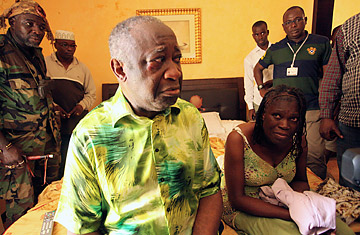
Laurent Gbagbo, former President of Ivory Coast, and his wife Simone are watched by republican forces in a hotel in Abidjan, Ivory Coast, on Monday, April 11, 2011
Laurent and Simone Gbagbo were once the most powerful — and most feared — couple in Ivory Coast. That all ended on April 11, 2011, when the Gbagbos, their son Michel and their remaining entourage surrendered to rebel forces and were taken from their stronghold in the presidential palace in the country's de facto capital, Abidjan. It was the conclusion of a five-month-long postelectoral crisis that saw at least 3,000 people die in horrific brutality. Husband and wife were separated and held in different towns, away from their power bases. Laurent is held in Kohorgo, a scorched, dusty town some 310 miles (500 km) north of Abidjan. Simone is under arrest in Odienne, another northern town.
A law dating back to the French-colonial era had been invoked to keep them under house arrest. But until Thursday, Aug. 18, the government of Alassane Ouattara had barely moved on any kind of prosecution of the couple. Now the Gbagbos have been charged with looting, armed robbery and embezzlement. These are not, however, the crimes against humanity they have been alleged to have committed — perhaps an indication that the divisions wrought by the recent civil war remain extremely sensitive.
The former President's refusal to concede victory to Ouattara after the November 2010 polls triggered the conflict that saw not only a lockdown of the country's economy but also the ravaging of Abidjan as pro-Gbagbo forces fired heavy ammunition into pro-Ouattara neighborhoods. Gbagbo militias reportedly abducted, tortured and killed hundreds of opponents. Laurent Gbagbo also allegedly siphoned funds from the central bank, even as his soldiers reportedly stole millions from the bank's branches in Abidjan. For her part, Simone Gbagbo was feared and loathed as the woman purportedly behind the so-called death squads that targeted her husband's political opponents. A trial date on the economic charges has yet to be set. If convicted, the couple, both in their 60s, face a maximum of 20 years in prison.
One major obstacle to justice is the disarray of the Ivorian legal system. (Prisons, for example, reopened only in the past week.) A Western diplomat says there could be "complications" in charging Gbagbo for certain crimes because he may enjoy some immunities as a former head of state. "The Ouattara government must ensure that Gbagbo's trial meets international standards, including the independence and impartiality of the judiciary and adequate time and resources for the preparation of a vigorous defense by competent counsel," says Human Rights Watch analyst Matt Wells. "President Ouattara's government should be commended for not giving former President Gbagbo the golden exile that many were suggesting," he continues. "But the decision to charge him with only economic crimes, when evidence suggests that he may be implicated in far more serious crimes, likely leaves many victims of the postelection violence in want of a more complete justice." Ouattara has invited the International Criminal Court to handle the delicate proceedings of war-crimes prosecution.
Gbagbo's lawyers have complained that the proceedings are not transparent. "We're not best pleased with the indictment. Their detention is illegal, and we are being kept in the dark about all the procedures. The judiciary process is being carried out in a secretive manner that isn't acceptable," Augustin Guehoum, a spokesman for Gbagbo's political party, tells TIME.
Meanwhile, other prosecutions have moved forward. Earlier this month, 12 senior members of Gbagbo's political party, including his son Michel, were charged with crimes against the state. A further 57 officers from the former regime have been indicted on charges of attacking state security. General Dogbo Ble, who commanded the elite and feared pro-Gbagbo Republican Guards, was also charged with arranging the abduction, torture and murder of four foreigners from the exclusive Novotel hotel days before Gbagbo's fall. Hotel manager Stephane Frantz di Rippel, French company director Yves Lambelin and two others were abducted by gunmen storming the hotel and were transported to the presidential palace. The dismembered torsos of two of the victims were later found dumped in the city's lagoon.
